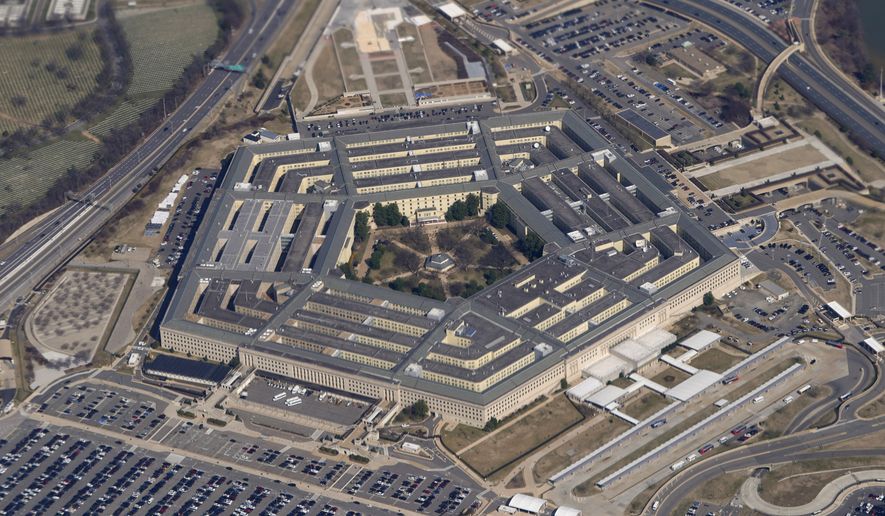Twitter worked behind the scenes with the Pentagon to aid in the U.S. military’s covert influence operations overseas, according to newly revealed internal documents that show the company broke its pledge to never help advance any government’s disinformation schemes.
Adding to recent revelations of Twitter’s coordination with federal law enforcement and intelligence officials to ban domestic users and censor their posts, the latest installment of Elon Musk’s “Twitter Files” shows company executives working with the Pentagon despite Twitter’s pledge to detect and disrupt state-backed information operations on its platform.
“But behind the scenes, Twitter gave approval & special protection to the U.S. military’s online psychological influence ops,” wrote investigative journalist Lee Fang, who published the international documents provided by Mr. Musk in a lengthy Twitter thread on Tuesday.
“Despite knowledge that Pentagon propaganda accounts used covert identities, Twitter did not suspend many for around 2 years or more. Some remain active,” wrote Mr. Fang, a reporter for The Intercept.
In one 2017 email, a contractor from U.S. Central Command (CENTCOM) asked Twitter to add a verification checkmark and “whitelist” several Arab language accounts that the military used to “amplify certain messages.”
“If you need any sort of paperwork of verification from our office or [U.S. Special Operations Command], please let me know,” the email reads. “Also, our SOCOM guys mentioned that they’d love to be able to come and meet up for a face-to-face to talk if you think the right Twitter folks would be up for it.”
The CENTCOM accounts were used by the military to promote anti-Iranian messages and the U.S.-backed war in Yemen and touted accurate drone strikes that the U.S. claimed took out only combatants.
On the same day that Twitter received the email, officials applied a “whitelist” tag to the accounts which exempted them from being identified as spam and made them more likely to trend on the platform.
CENTCOM later removed disclosures on the accounts tying them to the U.S. military.
Several internal emails from 2020 reveal Twitter executives and lawyers discussing the network of Pentagon accounts, including a list of 157 accounts that Twitter identified as cover accounts linked to the military that had gone undisclosed to the platform.
On May 2020, Lisa Roman from Twitter emailed the Pentagon the list of accounts that she said “may violate our rules.”
“Many of these secretive U.S. military propaganda accounts, despite detection by Twitter as late as 2020 (but potentially earlier) continued tweeting through this year, some not suspended until May 2022 or later, according to records I reviewed,” Mr. Fang wrote.
Other internal emails show that the Pentagon wanted to retroactively classify its work with social media companies, a proposal that drew concern from Twitter lawyer Stacia Cardille.
In a July 2020 email to her colleagues Angele Sherrer and James Baker, Ms. Cardille discussed an upcoming classified briefing that the Pentagon was attempting to arrange with social media executives.
“I heard from Facebook that they are securing SCIFs in DC and San Francisco for a meeting,” she said, referring to Sensitive Compartmented Information Facilities used to hold highly classified briefings.
“I have some significant concerns that the motivations for classifications are slightly different than the ones you outlined in the email below,” Ms. Cardille continued. “I think it is possible DOD is using retroactive classification to obfuscate their activity in this space and that this may represent an overclassification to avoid embarrassment.”
Both Twitter and the Pentagon have come under pressure amid recent revelations of the military’s widespread use of covert online propaganda accounts that promote U.S. interests and push fake news stories abroad to counter U.S. adversaries.
An August 2022 report by the Stanford Internet Observatory exposed hundreds of these accounts across Facebook, Telegram, Twitter and other online platforms.
“In subsequent reporting, Twitter was cast as an unbiased hero for removing ‘a network of fake user accounts promoting pro-Western policy positions,’” Mr. Fang wrote. “Media covering the story described Twitter as evenly applying its policies & proactive in suspending the DoD network.”
But Mr. Fang said Twitter waited years to suspend Pentagon accounts it had identified as violating its rules and said Twitter’s communications team kept in close touch with reporters to minimize Twitter’s exposure to bad press amid the fallout.
In one email, Twitter executives strategized their response to a Washington Post story on the Pentagon’s “sweeping review of clandestine psychological operations.”
“I suspect this piece will get more attention in Washington with the DoD angle — we’ll keep you posted,” a Twitter employee wrote, notifying her colleagues that “we declined to comment.”
“When the WashPost reported on the scandal, Twitter officials congratulated each other because the story didn’t mention any Twitter employees & focused largely on the Pentagon,” Mr. Fang wrote.
Tuesday’s installment of the Twitter Files follows previous releases showing the platform’s left-wing bent that led to the censorship of conservative viewpoints, the suppression of news reports about Hunter Biden’s laptop computer just weeks before the 2020 presidential election, and the decision to permanently ban Mr. Trump from the platform in the wake of the Jan. 6, 2021, attack on the U.S. Capitol.
Previous installments exposed the extent to which federal law enforcement and intelligence agencies worked with the platform to moderate speech, including back-channel communications to flag posts and ban users.
The revelations have set off a firestorm on Capitol Hill.
Last week, Republicans on the House Oversight and Reform Committee sent letters to Mr. Musk and Meta CEO Mark Zuckerberg requesting documents and communications from the companies for a congressional probe “to uncover any unconstitutional actions by government officials or agents working on their behalf.”
Republicans on the House Judiciary Committee are demanding several Big Tech companies hand over documents for its probe into the Biden administration’s attempts to curtail online freedom of speech.
• Joseph Clark can be reached at jclark@washingtontimes.com.




Please read our comment policy before commenting.